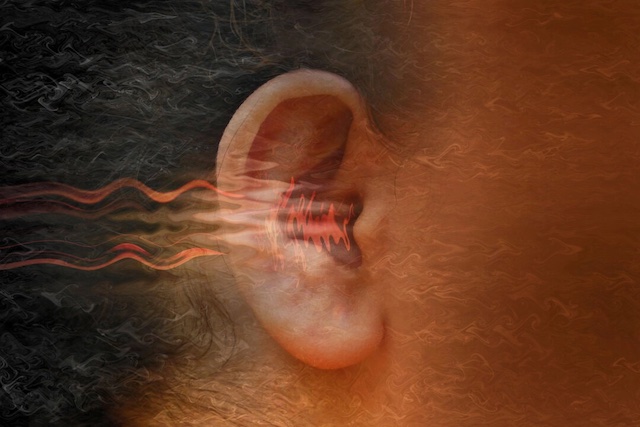COVID-19 vaccinations increase the risk of tinnitus according to a recent study led by researchers at the University of Arizona College of Medicine.
 “During the COVID-19 waves, we observed an increase in patients reporting auditory issues, including tinnitus. Similarly, after the vaccine rollouts, there was a noticeable uptick in tinnitus cases among vaccinated individuals, particularly those with specific metabolic histories or who experienced reactions post-vaccination,” Anusha Yellamsetty, audiologist, assistant professor at San José State University, and the second author of the study.
“During the COVID-19 waves, we observed an increase in patients reporting auditory issues, including tinnitus. Similarly, after the vaccine rollouts, there was a noticeable uptick in tinnitus cases among vaccinated individuals, particularly those with specific metabolic histories or who experienced reactions post-vaccination,” Anusha Yellamsetty, audiologist, assistant professor at San José State University, and the second author of the study.
The study, published in Frontiers in Pharmacology, evaluated COVID-19 vaccine-related tinnitus data in the Vaccine Adverse Event Reporting System (VAERS) and conducted a survey within a Facebook support group for post-vaccine tinnitus and hearing impairment.
“The frequency of tinnitus reports in the VAERS database is higher for COVID-19 than for other vaccines,” the authors wrote.
When they compared the survey data against that of VAERS, they also found that if the survey results were accurate, VAERS significantly underestimated COVID-19 vaccine-related tinnitus.
Risk Factors for Vaccine-Related Tinnitus
The researchers analyzed 12,532 cases of COVID vaccine-related tinnitus reported to VAERS between Jan. 1, 2020, and Nov. 26, 2021. They also evaluated 398 survey responses from a Facebook group comprised of around 2,000 members.
In the Facebook group, 336 respondents were evaluated for shared risk factors. Forty had hypertension, 39 were obese, and 40 had thyroid disorders. The authors thus suggested that metabolic disorders increase a person’s risk of tinnitus.
Hypertension, or high blood pressure, may damage the blood vessels supplying blood to the ears, leading to hearing damage. Hypothyroid conditions can inflame the inner ear.
The survey also revealed a possible link between post-vaccine tinnitus and genes. Thirty-six survey respondents reported that at least one other household member had also developed tinnitus after vaccination.
Ms. Yellamsetty, the audiologist, took an interest in post-vaccine tinnitus after developing the condition post-COVID vaccination.
“General tinnitus cases often present with a more gradual onset compared to the abrupt onset seen in post-vaccine tinnitus,” she said, adding that post-vaccine tinnitus can be more severe.
Through the survey, researchers identified one drug that appeared to help with tinnitus: the steroid prednisone. Steroids are often used to relieve tinnitus.
Dr. Keith Berkowitz, an internist and medical director at the Center for Balanced Health in New York who was not involved in the study, added that 88 of the 336 participants had allergies, and this risk was unexplored in the article.
A person prone to allergic reactions usually has high levels of histamine. Dr. Berkowitz said he has observed this in patients he has treated who got tinnitus after COVID vaccination. Sometimes, these cases of tinnitus can be alleviated with antihistamines like loratadine and cetirizine. Supplements like quercetin, N-acetyl cysteine (NAC), and vitamin C can also help reduce histamine.
Steroids have also been prescribed to reduce inflammation from histamine reactions and allergies, though these are not antihistamine drugs.
People with metabolic disorders and histamine reactions often have high levels of inflammation. Antihistamines help to reduce histamine presence and activity, which also reduces inflammation.
How Vaccines Might Cause Tinnitus
 Vaccines interact with the immune system. When the body overreacts to them, it can cause a systemic immune response that affects adjacent tissues and structures, possibly leading to tinnitus.
Vaccines interact with the immune system. When the body overreacts to them, it can cause a systemic immune response that affects adjacent tissues and structures, possibly leading to tinnitus.
However, since most reports of tinnitus are rapid-onset, appearing immediately or within two days, the study authors speculated that this is too fast to be caused by an overactive immune response to the vaccines.
“It is likely the vaccine adverse effect was mediated by a more direct pathway,” the authors wrote, suggesting that spike proteins, viral proteins the body makes after being vaccinated to trigger antibodies, may be causing the damage.
“Spike proteins have been shown to disrupt the blood-brain barrier, activate microglia/neuroinflammation and cause neuronal death,” the authors wrote. If this occurs near the ears or in the nerves supplying the ears, it can lead to tinnitus.
Furthermore, spike proteins can aggregate to form plaque proteins, which, in mass, lead to neurodegeneration.
“These … inflammation could disrupt blood-brain barrier and other brain function, and potentially lead to tinnitus and other mental health issues,” the authors wrote.
Dr. Berkowitz said that he was pleasantly surprised to see spike protein being considered as a mechanism for post-vaccine injuries. Since all COVID-19 vaccines produce spike proteins in the body, implications of spike proteins being potentially injurious can be controversial.
Another mechanism he proposed that could cause tinnitus is allergic or histamine reactions.
“Allergies are so common that a lot of people don’t consider it a serious medical risk factor,” said Dr. Berkowitz.
Histamine is released during allergic reactions. Since histamines can access neurons in the brain and the ears, it is possible that the heavy histamine release causes inflammation near the ears, leading to tinnitus and hearing damage.
Post-COVID vs. Post-Vaccine Tinnitus
 “Compared to COVID-19 vaccination, COVID-19 infection presents a much higher risk of developing tinnitus,” the authors wrote at the end of the study, citing a paper by researchers from the University of Lethbridge in Canada.
“Compared to COVID-19 vaccination, COVID-19 infection presents a much higher risk of developing tinnitus,” the authors wrote at the end of the study, citing a paper by researchers from the University of Lethbridge in Canada.
Dr. Berkowitz, who has treated hundreds of long-COVID and post-vaccine patients, said that the study’s observations do not reflect what he sees in his clinic.
“I haven’t seen any case of post-COVID tinnitus,” he said. However, the Canadian paper reported that around 5 percent of people infected with COVID-19 develop tinnitus.
Based on estimations from VAERS, the risk of post-vaccine tinnitus is less than 0.1 percent. If the authors relied on incidence from the survey alone, the risk could reach over 8 percent.
“Vaccination reduces the rate of infection and severity of the symptoms of COVID-19, potentially reducing the overall risk of developing tinnitus and other neurological and psychiatric diseases,” the authors added.
Recognizing Vaccine Adverse Events in Research
Dr. Berkowitz sees the recent tinnitus study as part of a trend where researchers are increasingly recognizing post-vaccine conditions and their mechanisms.
“The research climate regarding COVID-vaccine adverse events is evolving,” said Ms. Yellamsetty.
“Initially, there was significant controversy and sensitivity around discussing adverse events due to the urgent need for widespread vaccination and public health messaging. However, as the pandemic has progressed, there is growing recognition of the importance of understanding and addressing these adverse events.
“More researchers are now engaging with this topic, aiming to provide comprehensive data to ensure vaccine safety and efficacy while addressing public concerns. This shift towards a more balanced and open approach is crucial for advancing scientific knowledge and maintaining public trust in vaccination programs,” she added.
Written by Marina Zhang for Epoch Health ~ June 3, 2024
